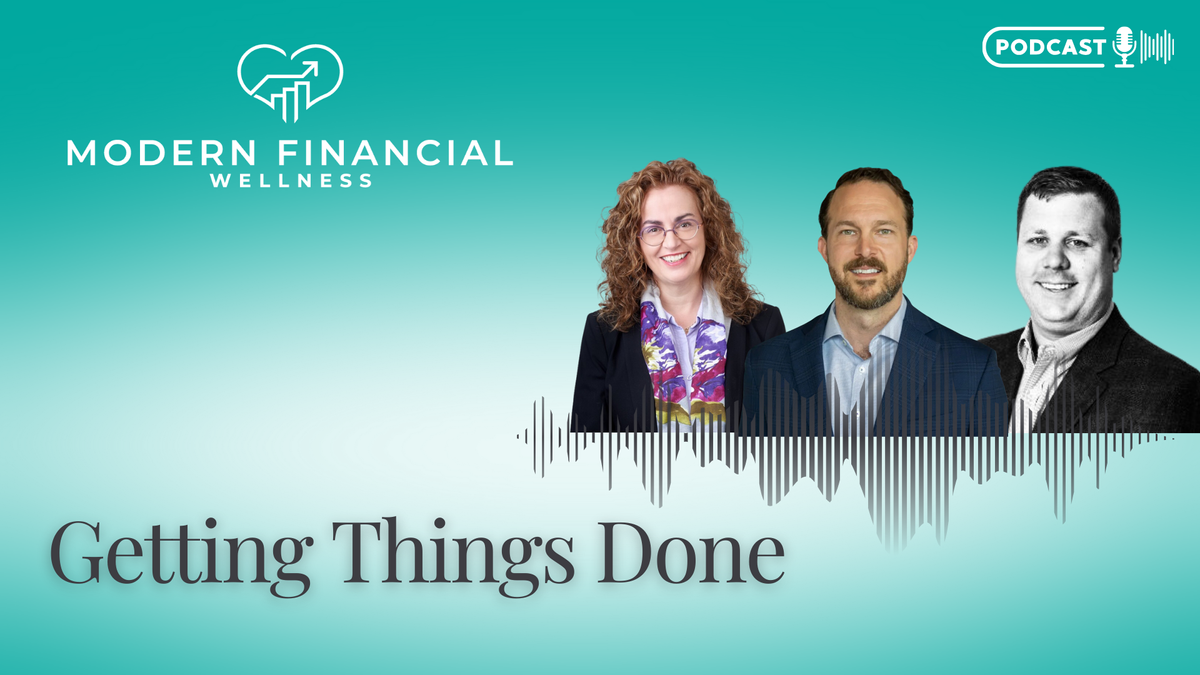EP:003 Getting Things Done w/ Dr. Moira Somers and Shaun Erikson

Not getting things done is a common problem that many of us suffer from. It comes in all shapes and sizes and can certainly appear when talking about finances. I know personally when I'm not getting things crossed off my to-do list I start feeling bad about it. Especially the financial things. I'm a financial planner after all, I should be able to get those things accomplished right?!
To help us better understand what might be going on I talked with Dr. Moira Somers, Ph. D., and Shaun Erickson, CFP®️.
In addition to being a wealth consultant and author, Dr. Somers is also a clinical neuropsychologist and completed her doctoral thesis on procrastination! You can check out more about her and her work on her website, moneymindmeaning.com.
Shaun is the founder Single Point Partners, a successful wealth management & financial planning firm in Boston uniquely focused on helping clients get things done. He even took that goal so far that he ended up founding a FinTech company called Knudge, a tool designed to help other financial advisors better support their clients in finishing their financial tasks. To date the app is helping over 800 financial advisors help their clients get things done!
HIGHLIGHTS:
3 REASONS WE DON'T COMPLETE FINANCIAL TASKS:
1) We Procrastinate: Sound familiar? We all put things off. I consider myself to be a top notch procrastinator. However, it becomes important to understand if we are putting things off as a way to avoid any negative emotions associated with our finances. We learn from Dr. Somers that procrastination is a common avoidance mechanism for dealing with our feelings.
The problem with this is that putting things off financially can cause us to miss opportunities. Say for example, by not transferring money into a high yield savings account like you've been meaning to do. It can also create negative financial consequences, like late fees piling up on the bills you are avoiding.
So being aware of any emotions keeping us from getting things done, or even keeping us from addressing things at all, becomes really important.
2) We're Overwhelmed: And that doesn't mean that we have so much to do that we are paralyzed from any action at all. We're just really busy and sometimes we have too much going on.
At a certain point our brains and bodies will demand that we prioritize because we only have so much mental, physical and emotional capacity to go around.
We tend to naturally prioritize the things that are right in front of us like the dirty laundry staring us in the face or that important deadline at work quickly approaching. So it shouldn't be surprising when things like changing your 401k contribution percentage ends up on the, "I'll get to that later" list.
3) We Forget. It's that simple. We are human beings, we have a lot going on and we just simply forget. In fact during our conversation Dr. Somers quoted research suggesting that...
"... 40-70% of our best intentions are forgotten."
These are things that we say are important to us and that we know we should try to complete. They just slip our minds. So next time you are starting to beat yourself up about forgetting to do something, give yourself some grace because you are human. I plan to remind myself of this fact much more often moving forward.
So what do you do about it? Here are some ideas from Moira and Shaun:
- Prioritize and figure out what's important, but don't over think it. Dr. Somers mentions a few times that "nothing feels as good as progress". So identifying the first small step you can take to get yourself moving in the right direction can be extremely valuable.
- Put systems in place to help you remember. You don't have to start your own FinTech company like Shaun. There are hundreds of useful apps, websites and products out there to help you be more organized and efficient with your time and energy. I'm currently using a project management website called Motion to help manage my to do list and calendar.
- Find support. Telling someone else about the things you hope to accomplish can make it easier to accomplish them. I currently participate in an accountability group. I find it to be very helpful. We meet once a month to let each other know about the important things we were hoping to accomplish and agree to help one another if we can. Knowing I have to face that group once a month definitely provides some much needed motivation. My wife calls them my "accountabili-buddies".
- When faced with something particularly emotionally challenging, ask yourself "when was the last time that I was up against something similar?" Most of us have been there before, we know what to do and sometimes just thinking about a past time when we might have been successful is a really good way to calm any negative emotions and a good catalyst for action. You got this!
- Schedule important tasks. Dr. Somers shares that "Its not real until it's scheduled." So make sure that if you have important things to get done that you make time for them and put them in your calendar.
- Try to reframe your thoughts on things. Instead of saying "I have to work out", try changing that to "I get to work out and improve my health".
READ+LISTEN+LEARN
Moira & Shaun Recommend:
- The work of Daniel Pink, author of such books as "Drive" and "The Power of Regret" among others.
- The work of Chip and Dan Heath.
- Behavioral scientist Katy Milkman's podcast "Choiceology"
- "A Slight Change of Plans" the podcast by cognitive scientist Maya Shankar.
Find Her @:
Website: https://moneymindandmeaning.com/
LinkedIn: https://www.linkedin.com/in/moira-somers/
Find Him @:
Website: https://spcfo.com/
Website: https://knudge.com/
LinkedIn: https://www.linkedin.com/in/shaun-erickson/
Twitter: https://twitter.com/Shaun_SPP